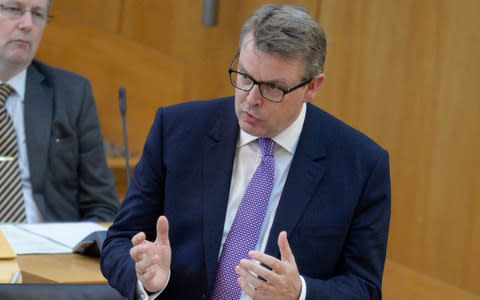Nicola Sturgeon accused of ignoring warnings about £12.3 billion cost of 'citizen's income'
Nicola Sturgeon has been accused of going ahead with plans to investigate a basic “citizen’s income” for every Scot despite a civil service warning that it would be “utterly unaffordable”.
The Scottish Conservatives said a briefing paper obtained under freedom of information revealed that spending on benefits could have to rise by £12.3 billion a year to cover the cost of the scheme.
The document, handed to the First Minister in March, also indicated that paying for it could mean basic income tax rates rising to 50 per cent.
The paper stated : “It is a very costly policy that is unlikely to gain public acceptability and ultimately may not have the desired transformative effect.”
However, Ms Sturgeon said the idea merited “deeper consideration” when she unveiled her programme for government last month, and said ministers would work with interested local authorities to research the concept.
The proposal was reinforced in her keynote speech to the SNP conference, when she said: “Last year, this conference asked us to investigate the feasibility of a citizen’s basic income (CBI). So we’ve announced the funding to do just that.”
Adam Tomkins, the Tory social security spokesman, said she was pandering to the extreme Left of the Yes movement in the hope they would not turn on her over poor polling figures and the fact that “separation is dead in the water”.

He added: “Nicola Sturgeon and her finance team were told in no uncertain terms that a scheme for citizen’s basic income would be utterly unaffordable and not remotely sustainable.
“Despite these stark warnings, she continued to create an impression that she was going to introduce it.
“But this briefing makes plain just how unworkable the CBI approach would be. Instead of playing to the gallery, the First Minister should explain exactly where she’s going to find the extra £12.3 billion that would be required each year to fund it.
“Or perhaps she’d like to tell taxpayers, including those on low incomes, that they’ll have to give back half their pay packet to bankroll this vanity project.”
The scheme would replace most benefits and the state pension with regular payments of thousands of pounds a year to all Scots, regardless of wealth.
The Tories said the document warning about the cost of CBI was given to Ms Sturgeon, the finance minister Derek Mackay and the social security minister Angela Constance, by Liz Hawkins, the Scottish Government’s housing and social justice director.

It warned CBI would “have little incentivising impact” and that “most governments will not be able to afford both CBI and a generous welfare state”.
The paper also described CBI as a radical reform with growing international support, while warning that implementing it could be “highly complex”
It said experimental schemes in other parts of the world had been funded with "windfall payments" but without this, tax increases would be necessary - with work by the Joseph Rowntree Foundation indicating CBI would need a tax rate on all earned income of about 40 per cent if housing benefit was not included, rising to over 50 per cent if CBI was to include housing benefit.
It also warned: "Due to differences in income distribution between Scotland and the rest of the UK, there may need to be an even higher tax rate in Scotland.”
Under proposals mooted by the Scottish Greens, children under 16 would receive £50 a week, teenagers between 16-18 would get £100 and pensioners £150.
This would equate to pounds5,200 per year for every working adult and pounds10,400 for a single parent with two children.
The Greens argued last month that the net cost would be on £1 billion if the basic rate of income tax jumped from 20 to 30 per cent, and the top rate from 45 to 50 per cent.
A spokesman for Ms Constance said the Tories had a record of “cruel welfare cuts” and their reaction to the proposal was “hysterical”.
She added: “Clearly, a nationwide citizen's basic income would be a significant financial investment - and the document does not suggest that this could be £12.3 billion as the Tories wrongly claim - but the whole point is that it could potentially lead to significant savings elsewhere in the social security system and in the wider public sector.”

 Yahoo News
Yahoo News 